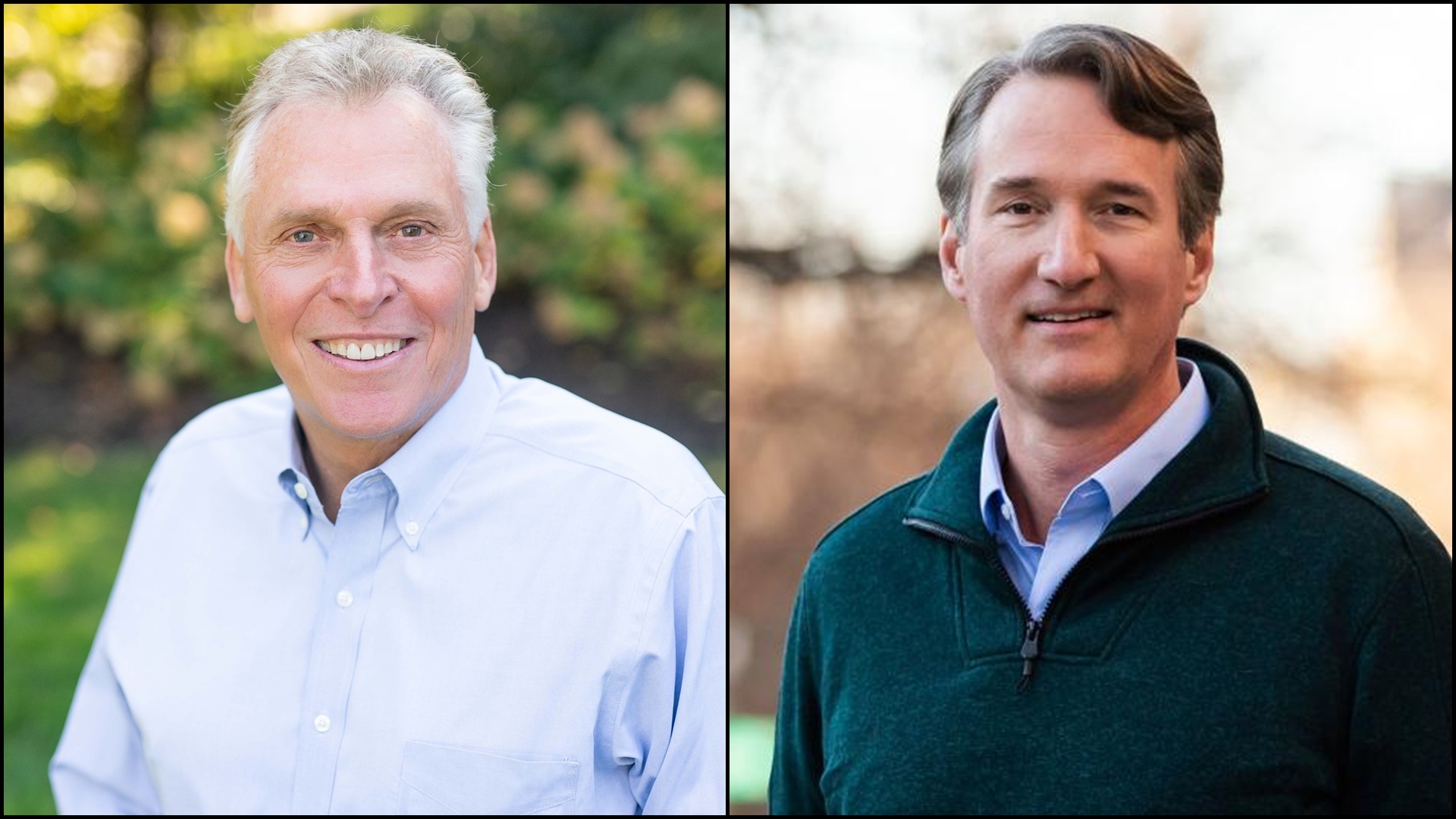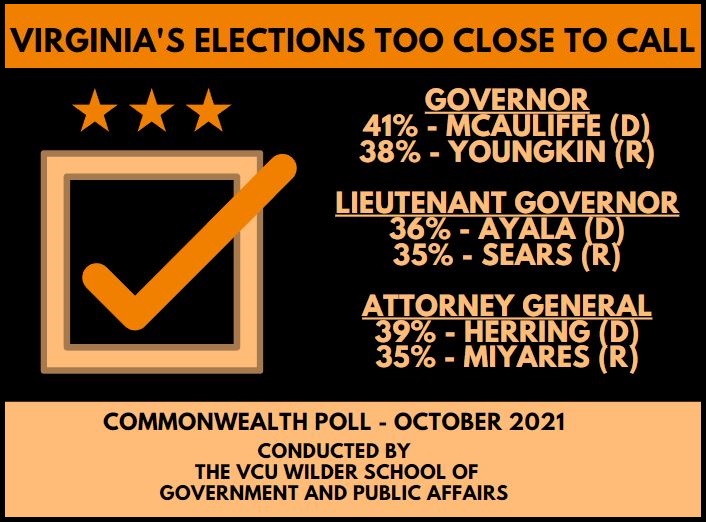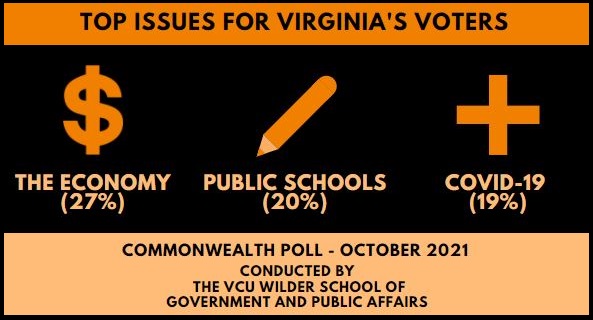News
Poll: Virginia’s elections are too close to call

FOR IMMEDIATE RELEASE
Republicans have closed wide leads of Democrats entering the final days of the campaign.
RICHMOND, Va. (Oct. 26, 2021) — Virginia’s gubernatorial election is nearly tied with 41% of likely voters supporting Democrat Terry McAuliffe and 38% supporting Republican Glenn Youngkin, according to the latest statewide poll conducted by the L. Douglas Wilder School of Government and Public Affairs at Virginia Commonwealth University. This is a substantial tightening of the race since last month when McAuliffe led 43% to 34% among likely voters.
With only one week left until the election and the gubernatorial race in a dead heat, independent and discontent voters might likely decide who will be the next governor of Virginia. Independent voters have increasingly identified with Youngkin (37%) rather than McAuliffe (31%), a six-point increase for Youngkin and a six-point decrease for McAuliffe since September.
Additionally, 10% of likely voters remain unhappy with either candidate. Of those, discontent voters identify more as Democrats than Republicans (11% and 8% respectively), bringing into question the impact that third-party candidate Princess Blanding might play on election day.
“The poll reflects a tightening of the race for the three top offices. The number of voters unhappy with either candidate for governor and the decrease in Northam’s approval rating is noteworthy,” said 66th Governor of Virginia L. Douglas Wilder.
The poll featured landline and telephone interviews from Oct. 9-21, with a representative sample of 808 adults living in Virginia. It had a margin of error of 5.03%. When considering likely voters only, the poll had a margin of error of 6.44%.
Regionally, Youngkin made the biggest gains this past month in Tidewater, where he now leads over McAuliffe (38% to 34%), a seven-point improvement for Youngkin since last month’s poll. Youngkin also took the lead in the northwest region of the state (41% to 37%) where the candidates had previously been tied. McAuliffe held his leads in Northern Virginia (53% to 31%) and south central Virginia (43% to 35%), while Youngkin held his lead in the western part of the state (51% to 30%).
According to likely voters, the top issues facing Virginia’s next governor are “the economy” (27%), “public schools” (20%), and “COVID-19” (19%). Voters trust Youngkin more than McAuliffe to handle the economy (48% to 40%), and McAuliffe more than Youngkin to handle public schools (45% to 42%) and COVID (45% to 39%), according to the poll.
In the race for lieutenant governor, Republican Winsome Sears has closed the gap on Democratic opponent Hala Ayala over the last month. Ayala now has the support of 36% of likely voters while Sears has 35%. In September Ayala held a three-point lead. The lack of a third-party candidate in the lieutenant governor race does not dismiss the impact of discontent voters on such a tight race. Of the 16% of likely voters who are still unhappy with either candidate, more are Democrats than Republicans (20% to 11% respectively).
The same trend exists for the candidates in the contest to be Virginia’s attorney general. Democrat Mark Herring leads 39% to 35% over his opponent, Republican Jason Miyares, among likely voters. However, Miyares has gained ground in each of the last three months while Herring has lost ground. Once again, the tightening margins between both candidates could be impacted by discontent voters. Of the 14% of those surveyed who still do not favor either candidate, more describe themselves as Democrat then Republican (16% to 8% respectively).
With all 100 seats in the Virginia House of Delegates up for election this year as well, control of the House chamber is as heavily contested as all three statewide offices. Likely voters slightly prefer Democrat party control over Republican party control in the House of Delegates (43% to 42% respectively), with Republicans gaining three points since September.
Enthusiasm may play a critical role in deciding close contests. Among likely voters, 87% of Republicans say they “definitely will” vote versus 74% of Democrats and Independents. Additionally, 82% of Republicans said they would vote for Youngkin if the election were being held today versus 76% of Democrats saying the same for McAuliffe.
These close races in Virginia highlight a divide among citizens on their views about the direction of the commonwealth. Virginians are evenly divided when asked whether the state is “headed in the right direction” or “on the wrong track” (46% for both). The divided electorate seems to also be impacting their views of Gov. Ralph Northam. Less than half (46%) of Virginians approve of the job that he is doing, a five-point drop since August.
“The poll reflects a tightening of the race for the three top offices. The number of voters unhappy with either candidate for governor and the decrease in Northam’s approval rating is noteworthy,” said 66th Governor of Virginia L. Douglas Wilder.
However, Virginians are not divided on their views about the nation. Less than 1 in 3 Virginians reported feeling that things in this country were “headed in the right direction” (30%) while almost two-thirds reported feeling that things in this country “were on the wrong track” (65%). This is also seen in President Joe Biden’s job performance ratings. Over half of Virginians (54%) disapprove of the job Biden is doing leading the country (a seven-point increase since August) while 41% approve (a ten point decrease since August).
For the full poll results and analysis, visit https://rampages.us/commonwealthpoll/
###
ABOUT THE L. DOUGLAS WILDER SCHOOL OF GOVERNMENT AND PUBLIC AFFAIRS
Ranked in the top 15 percent nationally among schools of public affairs, the L. Douglas Wilder School of Government and Public Affairs at Virginia Commonwealth University advances excellence in governance and promotes evidence-based public policy in Virginia and beyond. The Wilder School offers an array of graduate and undergraduate programs in virtually every policy area including criminal justice, homeland security and emergency preparedness, public administration, public policy and administration, and urban and regional studies and planning. Additionally, the Wilder School is home to robust centers and institutes that provide applied research in the areas of state and local government, social equity, and leadership and a range of services to clients in state and local government, nonprofit organizations, businesses and the general public. Learn more at wilder.vcu.edu.
ABOUT THE VCU WILDER SCHOOL COMMONWEALTH POLL
For nearly three decades, the VCU Wilder School Commonwealth Poll has been an important bellwether for policymakers in Virginia and beyond on a range of topics, including voting intentions, economic and workforce development, education, housing, public health, public safety and racial equity. The Commonwealth Poll was featured 2020 Presidential Election Poll by CNN, approved based on a rigorous review of methodologies and assumptions that ensure that CNN-cited polling entities are employing the gold standard in public opinion research.
